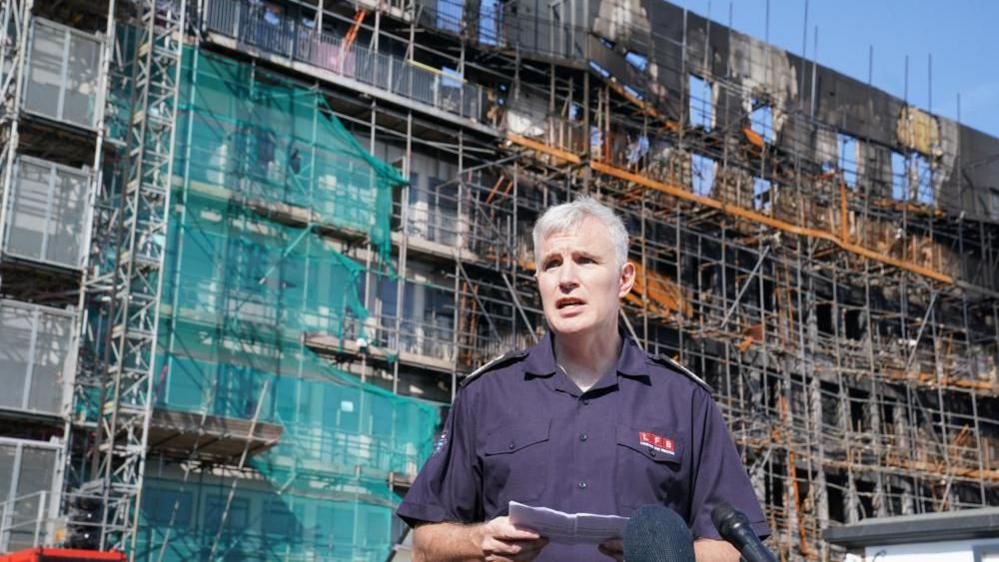Dagenham investigation will be 'complex' - fire chief

London Fire Brigade Commissioner Andy Roe told reporters that parts of the building remain inaccessible
- Published
The investigation into the Dagenham fire is likely to be protracted and complex, with parts of the building still inaccessible because of safety fears, London Fire Brigade's commissioner has said.
Speaking from the scene, Andy Roe said firefighters had faced a “very significant building failure” and that the investigation would be an "absolute priority" for the service over the coming weeks.
Deputy Prime Minister Angela Rayner told the BBC that, seven years on from the Grenfell fire, work to improve the fire safety on buildings across the country was "still too slow".
More than 100 people were evacuated from the block in Dagenham, east London, and two people taken to hospital, after a fire broke out in the early hours of Monday morning.
The exact cause of Monday's fire and its spread remains unclear.
According to a Facebook post from a contractor last week, the building's "non-compliant" cladding was in the process of being removed.
A planning application document also details "remedial" work being undertaken to remove and replace "non-compliant cladding" on the fifth and sixth floors.
Commissioner Roe said the fire service had begun a “full and detailed investigation" in collaboration with the police.
“However, due to the extensive damage to the building, with parts of it now being declared unsafe to access, it is difficult to make entry in there to do that investigation," he said.
“That means it is likely to be protracted and our fire investigation and fire safety officers are likely to be on-scene for many days."
He added that the fire service was engaged with government to ensure fire safety standards were maintained but faced a "challenge" when trying to hold the owners of buildings to account.
He said there were still 1,300 buildings in London with fire safety issues and that it was the responsibility of their owners to make sure their safety systems were functioning properly.
Deputy PM: There is still far too much cladding on these buildings
The Grenfell fire, in which 72 people were killed, brought the issue of fire safety to wider public attention.
Concerns focused in particular on cladding that had been added to the exterior of the building and which enabled the fire to spread.
Government figures show that, of 4,600 buildings subsequently identified as having cladding that was potentially unsafe, only 50% have had work to replace it either started or completed.
Also speaking from Dagenham, Ms Rayner said that that work "has to be sped up".
“There is responsibilities on... the people that own the buildings, but there’s also work that we’ve put in to make sure there is the funds available to get this remediation work done," she said.
“And we’ve got to make sure that the regulators are pushing that agenda, because we still have far too many buildings that have got this cladding on that needs to be removed.
“There’s a responsibility to make sure that that’s removed as quickly as possible.”
She added that it was "incredible that nobody was seriously injured” in the Dagenham fire and that the government was working with the local council to ensure affected residents "have somewhere to go and a roof over their heads".
Bride-to-be loses wedding dress in tower block fire
- Published27 August 2024
'We somehow got out' of London tower inferno
- Published27 August 2024
Drone footage captures fire engulfing Dagenham flats
- Published26 August 2024
Barking and Dagenham Council has said the building affected by Monday's fire was privately-owned, but that it was working to provide support to residents.
"Together with our partners, we have provided access to essential services, including emergency accommodation to residents who are unable to return home and have nowhere to stay," it said.
“Working with housing providers, we’ll continue to support residents to secure longer term accommodation."
The concerns about fire safety were echoed by Matt Wrack, general secretary of the Fire Brigades Union, who said firefighters were being put in an “impossible position”.
He said blocks such as the one in Dagenham should be designed to contain a fire in one flat, but crews had arrived to find a fire "far worse than expected" with "bits of burning cladding falling from the building".
"What shouldn't be happening is the fire spreading across the entire building, as it has done, clearly, here,” he said.
He added his union had been warning about shortcomings in fire safety standards since before Grenfell and the pace of change was “too slow”.
“We don’t know the scale of that failure here. But it seems to me that people are not taking fire safety in residential buildings seriously enough," he said.
"We’ve got a new government, and I hope they will sit up and take notice and work with us... to correct this.”